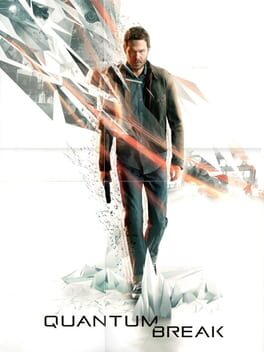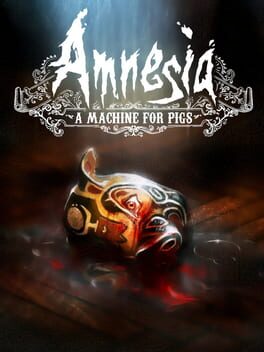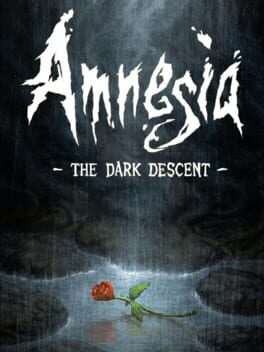szymon
Bio
Nothing here!
Badges

Noticed
Gained 3+ followers

Busy Day
Journaled 5+ games in a single day

Liked
Gained 10+ total review likes
032
Total Games Played
024
Played in 2024
000
Games Backloggd
Recently Played See More
Recently Reviewed See More
TL;DR: This doesn’t feel like a Remedy game.
The experience is difficult from the very beginning - the initial 30 minutes or so are surprisingly sloppy. We’re dividing our attention between Jack dumping exposition regarding his brother and Paul, future Jack dumping exposition during his deposition, at the same time slowly walking around and gathering notes and memos to read more exposition, then following Paul and listening to him providing to us, you guessed it, more exposition. There’s even an actual PowerPoint presentation. This does not encourage players to jump into this world, quite the opposite. And the worst part is - all that exposition is in service of an extremely bland, uninteresting story.
I’ll be the first to admit that I don’t enjoy time traveling as a narrative concept. I think it’s inherently broken and writers often abuse various implications from characters being able to travel between different periods in time. And yeah, I couldn’t get into this story either, but I don’t think it’s fair to say it’s only due to my dislike of this particular genre. I couldn’t care less about the time travel machines, the implications of ‘ripples’, etc. mostly because the characters were not at all interesting. The game attempts to build this rivalry between Paul and Jack and does so sloppily. Whenever these two would face off I felt nothing, including the shockingly anticlimactic conclusion. Hatch rides on Reddick’s charisma and nothing else, Beth is kind of a wet blanket, and some other supporting characters like Liam, Charlie or Fiona (present almost exclusively in the show) mostly fall flat as well. The game wants you to believe that total annihilation is what’s at stake - that if Jack doesn’t succeed then ‘the end of times’ will take place. But this is such a vague and abstract concept that I couldn’t bring myself to give a shit about what happens to this world, also due to my not sympathizing with even a single character in the story.
Also, the game takes itself too seriously which makes the whole experience funnier, listening to cheesy lines about chronon fields, the end of time and whatnot uttered with straight faces. I’m pretty sure it would’ve worked better if the writers tried to lean into the cheesiness of the material they were working on.
Gameplay wise, it feels like squandered potential. Jack’s superpowers can be fun to use and even though they’re not overly original it feels good to slow down time, sprint between enemies and take them out one by one or to throw ‘time grenades’. However, in addition to those powers Jack is required to shoot his enemies down and I’m sad to report that the gunplay is simply unsatisfying. Most guns feel like peashooters with no punch, and some annoy with ridiculous recoil. I really wish Remedy had removed the ability to use firearms altogether and just focused on developing the time powers to make them the only available way to fight. Also, enemy design is just lazy.
The game doesn’t play great, but looks even worse. To be clear, I don’t mean the quality of the animations or character models - these all hold up well, although I’ll never believe that Aidan Gillen is below 30, even with that ridiculous glow up he’s given in the opening chapter. But ‘Quantum Break’ probably includes the most boring art direction I’ve seen in a AAA game. Every location is extremely bland, just a generic city with generic buildings and generic interiors. That includes even some areas where the creators could’ve potentially employed some more unusual concepts, like the time machine and all the relevant macguffins like weapons, armours, labs, etc. Instead, every little visual detail looks like something that’s been included in a dozen other games and shows with a similar minimalist, ‘clean’ aesthetic. Maybe it was done purposefully in order to be consistent with the show which looks equally bland, but I wish they’d showed some more creativity in that department regardless.
Another disappointing element was the level design. I struggle to recall any memorable set pieces or combat arenas or any of the like (there are some ‘platforming’ sections, but I’ll do the devs a favor and refrain from elaborating on those). Everything seemed very straightforward, with a couple of very simple puzzles thrown in to break up the monotony of the main gameplay loop. These aren’t too difficult also because the game uses its own version of ‘witcher vision’ (I just double checked and yes, it’s called ‘Time Vision’, Jesus Christ). So you don’t even need to think too much about what to do next, you just click a button and receive a solution instantly. I doubt I’m the only one who hates this mechanic as it makes the games just too easy and level designers too lazy (why bother directing the player through environmental clues? Just click a button to highlight all important parts, or spray the only available route among the rubble with yellow paint - there are many offenders in this area, this game naturally being one of them).
The time mechanic could’ve been used in a million ways to create some clever puzzles or obstacle courses for Jack to solve between shooting down Monarch guards. The only ones we’re given boil down to “hold Y to reverse time for a bit” and voila. It’s also infuriating how limiting the game is, e.g. only allowing you to climb specific objects that the devs wanted you to climb and whenever you want to get up an object of the same or even lower height, Jack just bumps off them. This is really detrimental to any attempt at building immersion.
One thing that I liked from the narrative standpoint was allowing you to make decisions as Paul. These then influence which of two episodes of the show you will see. It’s a neat idea and gives you some feeling of power over the story, but if I’m not mistaken it only changes things in the show - the game stays the same regardless of your choices, which is a bit disappointing.
A large part of the game’s marketing campaign was that Quantum Break was an experience combining a video game with an ‘equally important’ TV show. And yes, there are four short (around 22-24mins) episodes that delve more into the events behind the scenes and focusing mostly on characters not given significant time in (or absent at all from) the game. First of all - it’s very clear that the video game was the primary focus of the creators and the show is filling in gaps that otherwise would’ve been either included as cutscenes or as memos/e-mails/notes (boy, do Remedy love those). And I think it would’ve been fine, because the show’s production value is one of the lowest I’ve seen. It’s mostly actors walking around large, empty, cheap-looking sets and exchanging exposition. It’s a shame, because they clearly spent some money to get people like Aidan Gillen or Lance Reddick, but even their charisma can’t save this vapid, sometimes straight up dumb script. The inclusion of the poorly made TV show makes the whole experience feel cheaper and cheesier than if the information from the show was given to the player using in-game methods.
The game clearly wanted to be a blockbuster - a high budget story with high stakes and some recognizable faces playing the main characters. But the whole experience is so bland and uninteresting it’s almost hard to believe that it was Remedy who was behind it. This doesn’t feel like a product of a developer with almost two decades of experience in groundbreaking storytelling. It feels like a copout, a safe, focus group-driven product delivered to a major publisher who was in his TV era (yes, Xbox, we remember) and needed a showcase for the ideas behind his newest toy.
I also encountered some problems in the technical department, like how is this game locked at 30fps in such a low resolution on Series X? Many cutscenes included some odd stutters. Also, the episodes aren’t available to stream anymore which is disappointing - I had to watch them in pisspoor quality on Youtube. There was one cutscene that anytime I wanted to skip it would just crash the game. One little detail I also need to mention - this one time when Jack was talking on the phone I zoomed in to see whether I could see the phone screen. I could and I only saw the menu - why are you pretending to be on the phone, Jack?!
So yeah, it’s a skip.
The experience is difficult from the very beginning - the initial 30 minutes or so are surprisingly sloppy. We’re dividing our attention between Jack dumping exposition regarding his brother and Paul, future Jack dumping exposition during his deposition, at the same time slowly walking around and gathering notes and memos to read more exposition, then following Paul and listening to him providing to us, you guessed it, more exposition. There’s even an actual PowerPoint presentation. This does not encourage players to jump into this world, quite the opposite. And the worst part is - all that exposition is in service of an extremely bland, uninteresting story.
I’ll be the first to admit that I don’t enjoy time traveling as a narrative concept. I think it’s inherently broken and writers often abuse various implications from characters being able to travel between different periods in time. And yeah, I couldn’t get into this story either, but I don’t think it’s fair to say it’s only due to my dislike of this particular genre. I couldn’t care less about the time travel machines, the implications of ‘ripples’, etc. mostly because the characters were not at all interesting. The game attempts to build this rivalry between Paul and Jack and does so sloppily. Whenever these two would face off I felt nothing, including the shockingly anticlimactic conclusion. Hatch rides on Reddick’s charisma and nothing else, Beth is kind of a wet blanket, and some other supporting characters like Liam, Charlie or Fiona (present almost exclusively in the show) mostly fall flat as well. The game wants you to believe that total annihilation is what’s at stake - that if Jack doesn’t succeed then ‘the end of times’ will take place. But this is such a vague and abstract concept that I couldn’t bring myself to give a shit about what happens to this world, also due to my not sympathizing with even a single character in the story.
Also, the game takes itself too seriously which makes the whole experience funnier, listening to cheesy lines about chronon fields, the end of time and whatnot uttered with straight faces. I’m pretty sure it would’ve worked better if the writers tried to lean into the cheesiness of the material they were working on.
Gameplay wise, it feels like squandered potential. Jack’s superpowers can be fun to use and even though they’re not overly original it feels good to slow down time, sprint between enemies and take them out one by one or to throw ‘time grenades’. However, in addition to those powers Jack is required to shoot his enemies down and I’m sad to report that the gunplay is simply unsatisfying. Most guns feel like peashooters with no punch, and some annoy with ridiculous recoil. I really wish Remedy had removed the ability to use firearms altogether and just focused on developing the time powers to make them the only available way to fight. Also, enemy design is just lazy.
The game doesn’t play great, but looks even worse. To be clear, I don’t mean the quality of the animations or character models - these all hold up well, although I’ll never believe that Aidan Gillen is below 30, even with that ridiculous glow up he’s given in the opening chapter. But ‘Quantum Break’ probably includes the most boring art direction I’ve seen in a AAA game. Every location is extremely bland, just a generic city with generic buildings and generic interiors. That includes even some areas where the creators could’ve potentially employed some more unusual concepts, like the time machine and all the relevant macguffins like weapons, armours, labs, etc. Instead, every little visual detail looks like something that’s been included in a dozen other games and shows with a similar minimalist, ‘clean’ aesthetic. Maybe it was done purposefully in order to be consistent with the show which looks equally bland, but I wish they’d showed some more creativity in that department regardless.
Another disappointing element was the level design. I struggle to recall any memorable set pieces or combat arenas or any of the like (there are some ‘platforming’ sections, but I’ll do the devs a favor and refrain from elaborating on those). Everything seemed very straightforward, with a couple of very simple puzzles thrown in to break up the monotony of the main gameplay loop. These aren’t too difficult also because the game uses its own version of ‘witcher vision’ (I just double checked and yes, it’s called ‘Time Vision’, Jesus Christ). So you don’t even need to think too much about what to do next, you just click a button and receive a solution instantly. I doubt I’m the only one who hates this mechanic as it makes the games just too easy and level designers too lazy (why bother directing the player through environmental clues? Just click a button to highlight all important parts, or spray the only available route among the rubble with yellow paint - there are many offenders in this area, this game naturally being one of them).
The time mechanic could’ve been used in a million ways to create some clever puzzles or obstacle courses for Jack to solve between shooting down Monarch guards. The only ones we’re given boil down to “hold Y to reverse time for a bit” and voila. It’s also infuriating how limiting the game is, e.g. only allowing you to climb specific objects that the devs wanted you to climb and whenever you want to get up an object of the same or even lower height, Jack just bumps off them. This is really detrimental to any attempt at building immersion.
One thing that I liked from the narrative standpoint was allowing you to make decisions as Paul. These then influence which of two episodes of the show you will see. It’s a neat idea and gives you some feeling of power over the story, but if I’m not mistaken it only changes things in the show - the game stays the same regardless of your choices, which is a bit disappointing.
A large part of the game’s marketing campaign was that Quantum Break was an experience combining a video game with an ‘equally important’ TV show. And yes, there are four short (around 22-24mins) episodes that delve more into the events behind the scenes and focusing mostly on characters not given significant time in (or absent at all from) the game. First of all - it’s very clear that the video game was the primary focus of the creators and the show is filling in gaps that otherwise would’ve been either included as cutscenes or as memos/e-mails/notes (boy, do Remedy love those). And I think it would’ve been fine, because the show’s production value is one of the lowest I’ve seen. It’s mostly actors walking around large, empty, cheap-looking sets and exchanging exposition. It’s a shame, because they clearly spent some money to get people like Aidan Gillen or Lance Reddick, but even their charisma can’t save this vapid, sometimes straight up dumb script. The inclusion of the poorly made TV show makes the whole experience feel cheaper and cheesier than if the information from the show was given to the player using in-game methods.
The game clearly wanted to be a blockbuster - a high budget story with high stakes and some recognizable faces playing the main characters. But the whole experience is so bland and uninteresting it’s almost hard to believe that it was Remedy who was behind it. This doesn’t feel like a product of a developer with almost two decades of experience in groundbreaking storytelling. It feels like a copout, a safe, focus group-driven product delivered to a major publisher who was in his TV era (yes, Xbox, we remember) and needed a showcase for the ideas behind his newest toy.
I also encountered some problems in the technical department, like how is this game locked at 30fps in such a low resolution on Series X? Many cutscenes included some odd stutters. Also, the episodes aren’t available to stream anymore which is disappointing - I had to watch them in pisspoor quality on Youtube. There was one cutscene that anytime I wanted to skip it would just crash the game. One little detail I also need to mention - this one time when Jack was talking on the phone I zoomed in to see whether I could see the phone screen. I could and I only saw the menu - why are you pretending to be on the phone, Jack?!
So yeah, it’s a skip.
Ahead of the upcoming release of the sequel, I decided to return to ‘Hellblade’ to refresh my memory and to be able to notice (and hopefully appreciate) all the changes included in ‘Senua’s Saga: Hellblade 2’.
The second playthrough didn’t change my general view of the game - it’s a must-play for anyone seeking a rich narrative experience with a couple of issues that hold the game back from being a true masterpiece.
The good stuff first - the game is built around a really interesting story that is told with maturity and boldness rarely seen in other games. Senua’s desperate, exhausting journey towards redemption and her gradual unlocking and analysis of past events to remove the shackles imposed by her upbringing is truly fascinating to watch. Dip all that in a healthy dose of Norse mythology, some top notch acting (Melina Juergens is a star) and you’ll end up with a truly special narrative experience. The game delves heavily into the topics of mental health and psychosis in particular, with one of its most advertised features being ‘voices in your head’ (first time in forever I played a console game with a headset, simply because it’s one of the few games where it enhances the experience significantly, even if sometimes those voices offer input on puzzle solutions too quickly). This helps tremendously in immersing yourself in the story and in sympathizing with Senua. The topic of ignorance of complex mental issues paired with religious zealotry is also an important part of the game. By the end of the story I felt truly proud of Senua, even if the final song was too cheesy and on the nose for my taste.
In a lot of ways the gameplay serves the narrative, with one of the most obvious examples being Senua searching for runes hidden in the environment. I think it’s a neat idea, however I did feel like the game relied too heavily on it - that also includes the mechanic of “look through gate to open path”, which appeared too many times for my liking.
The game breaks up the pace in a number of ways, e.g. when Senua needs to stealthily move amongst monsters made of pulsating flesh, running between sources of light to evade a ‘dragon’ or sprinting through a burning house. These are truly standout moments in the game.
A whole other thing is combat. I have a problem with it simply because I realize it was not intended to be “fun” - quite the opposite, actually. If these encounters symbolize Senua struggling to go on, her debilitating illness trying to stop her from continuing her quest, then fighting off the physical manifestations of it should be frustrating and difficult. However, I felt like the combat sections gave up on their narrative significance quite quickly and became simply a thing for the player to do (there are a few moments where it makes sense to have Senua fight off hordes of enemies, to be fair). Perhaps the developers were afraid that without them the game would be too akin to walking simulators and written off by many players disliking that particular genre. I, for one, wouldn’t mind being challenged in other ways (e.g. through more complex puzzles) to emphasize Senua’s struggles. The combat itself is pretty run of the mill, with camera being often detrimental when fighting several enemies at once. Same with switching targets - I don’t think the combat system was well designed to accommodate more than 1-2 opponents at once. Also - please, include an option to sprint next time, in some larger areas it took forever to get between points of interest.
The second playthrough didn’t change my general view of the game - it’s a must-play for anyone seeking a rich narrative experience with a couple of issues that hold the game back from being a true masterpiece.
The good stuff first - the game is built around a really interesting story that is told with maturity and boldness rarely seen in other games. Senua’s desperate, exhausting journey towards redemption and her gradual unlocking and analysis of past events to remove the shackles imposed by her upbringing is truly fascinating to watch. Dip all that in a healthy dose of Norse mythology, some top notch acting (Melina Juergens is a star) and you’ll end up with a truly special narrative experience. The game delves heavily into the topics of mental health and psychosis in particular, with one of its most advertised features being ‘voices in your head’ (first time in forever I played a console game with a headset, simply because it’s one of the few games where it enhances the experience significantly, even if sometimes those voices offer input on puzzle solutions too quickly). This helps tremendously in immersing yourself in the story and in sympathizing with Senua. The topic of ignorance of complex mental issues paired with religious zealotry is also an important part of the game. By the end of the story I felt truly proud of Senua, even if the final song was too cheesy and on the nose for my taste.
In a lot of ways the gameplay serves the narrative, with one of the most obvious examples being Senua searching for runes hidden in the environment. I think it’s a neat idea, however I did feel like the game relied too heavily on it - that also includes the mechanic of “look through gate to open path”, which appeared too many times for my liking.
The game breaks up the pace in a number of ways, e.g. when Senua needs to stealthily move amongst monsters made of pulsating flesh, running between sources of light to evade a ‘dragon’ or sprinting through a burning house. These are truly standout moments in the game.
A whole other thing is combat. I have a problem with it simply because I realize it was not intended to be “fun” - quite the opposite, actually. If these encounters symbolize Senua struggling to go on, her debilitating illness trying to stop her from continuing her quest, then fighting off the physical manifestations of it should be frustrating and difficult. However, I felt like the combat sections gave up on their narrative significance quite quickly and became simply a thing for the player to do (there are a few moments where it makes sense to have Senua fight off hordes of enemies, to be fair). Perhaps the developers were afraid that without them the game would be too akin to walking simulators and written off by many players disliking that particular genre. I, for one, wouldn’t mind being challenged in other ways (e.g. through more complex puzzles) to emphasize Senua’s struggles. The combat itself is pretty run of the mill, with camera being often detrimental when fighting several enemies at once. Same with switching targets - I don’t think the combat system was well designed to accommodate more than 1-2 opponents at once. Also - please, include an option to sprint next time, in some larger areas it took forever to get between points of interest.




